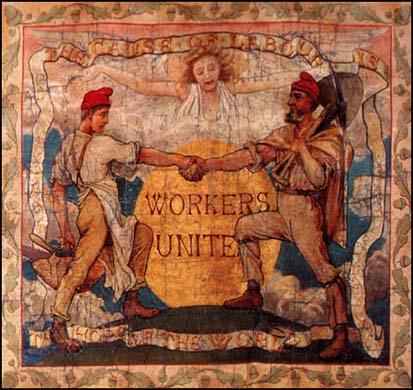National Union of Gasworkers
In March, 1889, workers from the Beckton Gas Works were laid off. Gas workers from all over London held a protest meeting on Sunday, 31st March. One of the speakers at the meeting, Will Thorne, suggested that the gas workers formed their own union to protect themselves from the power of their employers. Thorne told the assembled men "I pledge my word that, if you will stand firm and don't waver, within six months we will claim and win the eight-hour day, a six-day week and the abolition of the present slave-driving methods in vogue not only at the Beckton Gas Works, but all over the country."
Will Thorne, Ben Tillett and William Byford formed a three man committee and that morning they recruited over 800 members. The committee then had responsibility of forming what became known as the National Union of Gasworkers & General Labourers. Elections were held and Thorne defeated Tillett for the post of General Secretary of the union.

Some members of the committee wanted the union to negotiate a 1s. a day increase in their wages. Will Thorne favoured a reduction in working hours, arguing that "the eight-hour day would not alone mean a reduction of four hours a day for the workers then employed, but that it meant a large number of unemployed would be absorbed, and so reduce the inhuman competition that was making men more like beasts than civilized persons.".
Thorne won the argument and began negotiations with the owners of the Gas Light and Coke Company, Beckton Gas Works and Nine Elms Gas Works. Within a few weeks Thorne had successfully negotiated an eight hour day in the industry. As they previously did twelve hour shifts, this was a great advert for union power and the Gasworkers' Union soon had over 20,000 members.
Primary Sources
(1) Will Thorne, speech at a meeting of gas workers in London (31st March, 1889)
Let me tell you that you will never get any alteration in Sunday work, no alteration in any of your conditions or wages, unless you join together and form a strong trade union. Then you will be able to have a voice and say how long will work, and how much you will do for a day's work.
It is easy to break one stick, but when fifty sticks are together in one bundle it is a much more difficult job. The way you have been treated in your work for many years is a scandalous, brutal, and inhuman. I pledge my word that, if you will stand firm and don't waver, within six months we will claim and win the eight-hour day, a six-day week and the abolition of the present slave-driving methods in vogue not only at the Beckton Gas Works, but all over the country.
(2) Will Thorne, My Life's Battles (1925)
After the speeches were over, I called for volunteers to form an organizing committee, of which George Angle was appointed the secretary; then we started to take down the names of the men who wanted to join up. Eight hundred joined that morning. The entrance fee was 1s., and we had to borrow several pails to hold the coppers and other coins that were paid in.
(3) In his book My Life's Battles Will Thorne explained how he persuaded his fellow members of the National Union of Gas Workers & General Labourers to campaign for the eight-hour day (1925)
It was proposed to petition the directors of the different companies in London for an advance of 1s. per day in the wages of all the workers. I opposed this; I wanted a reduction in the working hours. "Shorten the hours and prolong your lives," was my plea. I declared that the eight-hour day would not alone mean a reduction of four hours a day for the workers then employed, but that it meant a large number of unemployed would be absorbed, and so reduce the inhuman competition that was making men more like beasts than civilized persons.
